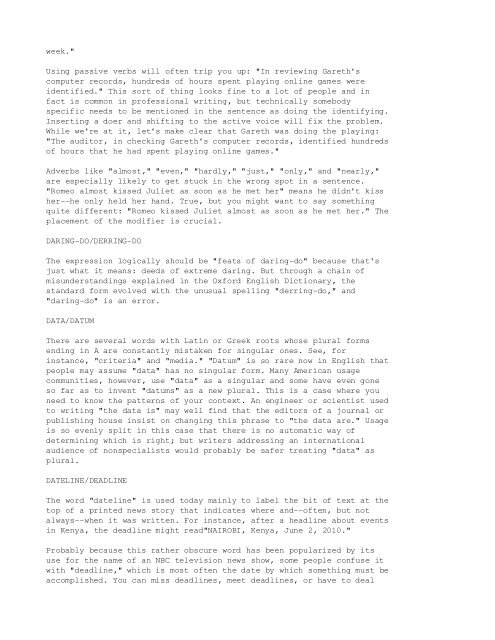Common_Errors_in_English_usage
Common_Errors_in_English_usage
Common_Errors_in_English_usage
Create successful ePaper yourself
Turn your PDF publications into a flip-book with our unique Google optimized e-Paper software.
week."<br />
Us<strong>in</strong>g passive verbs will often trip you up: "In review<strong>in</strong>g Gareth's<br />
computer records, hundreds of hours spent play<strong>in</strong>g onl<strong>in</strong>e games were<br />
identified." This sort of th<strong>in</strong>g looks f<strong>in</strong>e to a lot of people and <strong>in</strong><br />
fact is common <strong>in</strong> professional writ<strong>in</strong>g, but technically somebody<br />
specific needs to be mentioned <strong>in</strong> the sentence as do<strong>in</strong>g the identify<strong>in</strong>g.<br />
Insert<strong>in</strong>g a doer and shift<strong>in</strong>g to the active voice will fix the problem.<br />
While we're at it, let's make clear that Gareth was do<strong>in</strong>g the play<strong>in</strong>g:<br />
"The auditor, <strong>in</strong> check<strong>in</strong>g Gareth's computer records, identified hundreds<br />
of hours that he had spent play<strong>in</strong>g onl<strong>in</strong>e games."<br />
Adverbs like "almost," "even," "hardly," "just," "only," and "nearly,"<br />
are especially likely to get stuck <strong>in</strong> the wrong spot <strong>in</strong> a sentence.<br />
"Romeo almost kissed Juliet as soon as he met her" means he didn't kiss<br />
herhe only held her hand. True, but you might want to say someth<strong>in</strong>g<br />
quite different: "Romeo kissed Juliet almost as soon as he met her." The<br />
placement of the modifier is crucial.<br />
DARINGDO/DERRINGDO<br />
The expression logically should be "feats of dar<strong>in</strong>gdo" because that's<br />
just what it means: deeds of extreme dar<strong>in</strong>g. But through a cha<strong>in</strong> of<br />
misunderstand<strong>in</strong>gs expla<strong>in</strong>ed <strong>in</strong> the Oxford <strong>English</strong> Dictionary, the<br />
standard form evolved with the unusual spell<strong>in</strong>g "derr<strong>in</strong>gdo," and<br />
"dar<strong>in</strong>gdo" is an error.<br />
DATA/DATUM<br />
There are several words with Lat<strong>in</strong> or Greek roots whose plural forms<br />
end<strong>in</strong>g <strong>in</strong> A are constantly mistaken for s<strong>in</strong>gular ones. See, for<br />
<strong>in</strong>stance, "criteria" and "media." "Datum" is so rare now <strong>in</strong> <strong>English</strong> that<br />
people may assume "data" has no s<strong>in</strong>gular form. Many American <strong>usage</strong><br />
communities, however, use "data" as a s<strong>in</strong>gular and some have even gone<br />
so far as to <strong>in</strong>vent "datums" as a new plural. This is a case where you<br />
need to know the patterns of your context. An eng<strong>in</strong>eer or scientist used<br />
to writ<strong>in</strong>g "the data is" may well f<strong>in</strong>d that the editors of a journal or<br />
publish<strong>in</strong>g house <strong>in</strong>sist on chang<strong>in</strong>g this phrase to "the data are." Usage<br />
is so evenly split <strong>in</strong> this case that there is no automatic way of<br />
determ<strong>in</strong><strong>in</strong>g which is right; but writers address<strong>in</strong>g an <strong>in</strong>ternational<br />
audience of nonspecialists would probably be safer treat<strong>in</strong>g "data" as<br />
plural.<br />
DATELINE/DEADLINE<br />
The word "datel<strong>in</strong>e" is used today ma<strong>in</strong>ly to label the bit of text at the<br />
top of a pr<strong>in</strong>ted news story that <strong>in</strong>dicates where andoften, but not<br />
alwayswhen it was written. For <strong>in</strong>stance, after a headl<strong>in</strong>e about events<br />
<strong>in</strong> Kenya, the deadl<strong>in</strong>e might read"NAIROBI, Kenya, June 2, 2010."<br />
Probably because this rather obscure word has been popularized by its<br />
use for the name of an NBC television news show, some people confuse it<br />
with "deadl<strong>in</strong>e," which is most often the date by which someth<strong>in</strong>g must be<br />
accomplished. You can miss deadl<strong>in</strong>es, meet deadl<strong>in</strong>es, or have to deal





